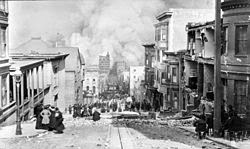 |
| Panoramic view of earthquake and fire damage from Stanford Mansion site, April 18–21, 1906 Image Source: en.wikipedia.org |
 |
| Stockton Street from Union Square, looking toward Market Street Image Source: en.wikipedia.org |
Earthquake history in the San Francisco area did not begin with the one recorded on this day in 1906 but history was made with it being scaled the highest...almost 8.0. Only one other occurred (1911) before San Francisco experienced a 68 year quiet period (1911-1979). Its magnitude reached 6.5.
 |
| Howard Street Image Source: en.wikipedia.org |
The sudden release of energy in the Earth's crust causes seismic waves, which are the result of an earthquake. Left in an earthquake's wake is evidence of death and massive destruction. As a result of the Great San Francisco Earthquake and the devastating fires inflicted upon the city, some 3,000 people died. Close to 30,000 buildings were destroyed. This included most of the city's homes and nearly all of the central business district.
The quake itself is not the high point of this post. It is a happenstance that occurred during the quake itself. When an earthquake hits, there is no preparation. It simply occurs. Without warning. That is the thought to keep in mind.
 |
| Arnold Genthe's famous photograph, looking toward the fire on Sacramento Street Image Source: en.wikipedia.org |
One of the most recorded eye-witness accounts of the Great San Francisco Earthquake came from Enrico Caruso. Caruso made his American debut at the Metropolitan Opera House in New York in 1903. He is considered by many music lovers to be the greatest operatic tenor of all time. His tour at this time in San Francisco included performing in Carmen at the Mission Opera House.
Having been abruptly awakened at 5 am, he recounted feeling "my bed rocking as though I am in a ship on the ocean." He recalls getting up, going to the window, raising the shade to a view that made him tremble with fear. Buildings were topping over, bit pieces of masonry falling all around, and from the street below, resounding cries and screams of men, women and children. He is speechless. Upon regaining composure, approximately 40 seconds had passed during which time 40 thousand different things passed through his mind. He gathers his faculties together and calls for his valet.
... we run down the stairs and into the street, and my valet, brave fellow that he is, goes back and bundles all my things into trunks and drags them down six flights of stairs and out into the open one by one. While he is gone for another and another, I watch those that have already arrived, and presently someone comes and tries to take my trunks saying they are his. I say, “no, they are mine”; but he does not go away. Then a soldier comes up to me; I tell him that this man wants to take my trunks, and that I am Caruso, the artist who sang in “Carmen” the night before. He remembers me and makes the man who takes an interest in my baggage “skiddoo” as Americans say.
Source: SFMuseum.org
Questionable courage? The question here is not so much about courage per se but the reason behind being so brave. The devoted valet managed to remove the bulk of Caruso's luggage, which included 54 steamer
trunks containing, among other things, some 50 self-portraits. Was it so important for the valet to risk his life for trunks filled with 'things', among which were items of nothing more than sheer vanity reflective of Caruso himself? Things are material and can be replaced. Life is priceless and not replaceable.
Should Caruso have been satisfied with his life and that of his valet being spared? Even one of his friends commented he had lost everything except his voice and was grateful. What about all of the people wailing and screaming in the streets? Could they have used assistance?
What do you think? Would love to know your thoughts...

No comments:
Post a Comment